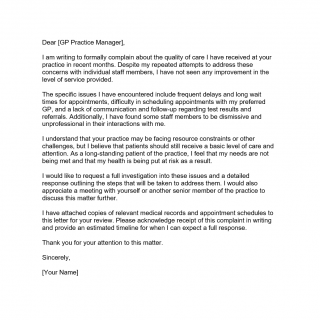Complaint Letter about a GP Practice
A complaint letter about a GP practice is an important tool for patients who have encountered issues with the quality of care provided by their healthcare provider. Its main purpose is to bring attention to specific complaints and advocate for improved patient care.
The letter consists of various parts, including a polite greeting, an introduction of the writer, a clear statement of the purpose of the letter, a detailed description of the problems encountered, and suggestions for potential solutions or changes. It is important to include specific details and examples of the issue, as well as any relevant documentation, such as medical records or appointment schedules.
The parties involved in this letter are the patient making the complaint and the GP practice that is the subject of the complaint. When writing this type of letter, it is important to consider the tone of the letter and the level of detail provided. The writer should remain factual and professional at all times, while also being clear about the impact the issues have had on them.
Strengths of this form/letter include its ability to hold GP practices accountable for providing quality care to patients and advocating for improvements. Weaknesses may include the potential for the practice to dismiss or ignore the complaint.
Alternative forms may include filing a complaint with a regulatory agency or seeking legal action. These options may be more appropriate in certain circumstances, depending on the severity of the issue and the desired outcome.
Applications and use cases for this letter include addressing issues related to long wait times, difficulty scheduling appointments, lack of communication, and unprofessional staff behavior.
How to complain about a GP practice:
- Identify the specific issue you want to complain about. It could be related to the quality of care you received, staff behavior, appointment scheduling, or any other aspect of your experience at the practice.
- Try to resolve the issue directly with the practice first. This can involve speaking to the GP or practice manager in person or over the phone. Sometimes, misunderstandings can be cleared up through direct communication.
- If you are unable to resolve the issue with the practice, find out if there is a formal complaints process in place. This information should be available on the practice's website or by contacting their administrative office.
- Follow the complaints procedure as outlined by the practice. This may involve submitting a written complaint or filling out a complaints form. Be sure to include all relevant details and information about the issue you are complaining about.
- Wait for a response from the practice. They may acknowledge receipt of your complaint and provide an estimated timeline for when you can expect a full response. In some cases, they may offer a meeting or phone call to discuss the issue further.
- If you are not satisfied with the practice's response, you can escalate the complaint to a higher authority. This could involve contacting a regulatory body such as the General Medical Council (GMC) or the Health Service Ombudsman.
- Keep records of all correspondence and interactions related to your complaint. This can include emails, letters, and notes from phone conversations. These records may be useful if you need to escalate the complaint further.
Complaint Letter sample
Dear [GP Practice Manager],
I am writing to formally complain about the quality of care I have received at your practice in recent months. Despite my repeated attempts to address these concerns with individual staff members, I have not seen any improvement in the level of service provided.
The specific issues I have encountered include frequent delays and long wait times for appointments, difficulty in scheduling appointments with my preferred GP, and a lack of communication and follow-up regarding test results and referrals. Additionally, I have found some staff members to be dismissive and unprofessional in their interactions with me.
I understand that your practice may be facing resource constraints or other challenges, but I believe that patients should still receive a basic level of care and attention. As a long-standing patient of the practice, I feel that my needs are not being met and that my health is being put at risk as a result.
I would like to request a full investigation into these issues and a detailed response outlining the steps that will be taken to address them. I would also appreciate a meeting with yourself or another senior member of the practice to discuss this matter further.
I have attached copies of relevant medical records and appointment schedules to this letter for your review. Please acknowledge receipt of this complaint in writing and provide an estimated timeline for when I can expect a full response.
Thank you for your attention to this matter.
Sincerely,
[Your Name]
Once the letter is written, it can be submitted via certified mail or email, with a copy kept for the writer's records. This will provide a record of delivery and ensure that it is received by the appropriate parties.
Overall, by submitting a complaint letter about a GP practice, patients can advocate for improved patient care and hold healthcare providers accountable for the quality of their services.

